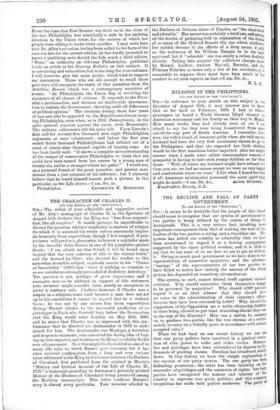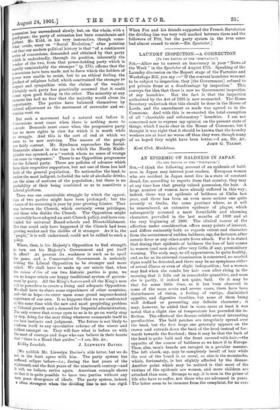THE DECLINE AND FALL OF PARTY GOVERNMENT.
[To THE EDITOR OF run "SrzerAron.-1 Sis,—It seems to be desirable that the, people of this island should come to recognise that our system of government by two parties is being reduced by the course of things to decrepitude. This is a very serious fact, involving more important consequences than that of making the task of the leaders of the- two parties a trying . and a thankless one. The systeM has suited our country so admirably that we have been accustomed to regard it as a lasting antmgement suggested by the ripest political wisdom, and it is little to say that we can none of us see how we are to get on without it. -Owing ao much good government as we have done to the representation of ' numerical' majorities and the alternate "innings" of the representatives of our two partieg, we have failed to. notice how entirely the success of the whole system has depended'on transitory. circumstances.
The system, as such, cannot defend itself against rational criticism. Why should minorities think themselves happy to be governed by majorities? Why should 4,959- persona regard it as an ideal scheme that they should have no voice:in the administration' of their' country's affairs because they have been outvoted by 5,000? Why should the strpporters of the Oppoiition see a noble citizenship fulfilled in their being allowed to put what stumbling-blocks they can in the way of the Ministry ? How can a nation be counted on to produce two parties like "the two elevens of a cricket match, to carry on a friendly game in accordance with certain
accepted rules ? -
When we .look back on our recent history we can goo that our party haye consisted in a- gradual exten- sion. of civic power to wider and wider circles. Monopo- lies and privileges have been surrendered by degrees to the deMands of growing classes. Freedom has bmidened.slowly down. In that history we have the simple. explanation of the success of our party system. The one party has been defending', possession;" the other has been insisting on the surrender of privileges and the extension of rights : but both parties have recognised the honour and interest of the country as supreme over party politics ; and this". comPon recognition has made both parties moderate. • The party of session has surrendered slowly, but, on the whole, with a pos good grace; the party of instructive, has been considerate and patient. Mr. Kidd, in his very nstructive, th ougn some- -what crude, essay on " Social Evolution," after pointing out that our modern political history is that "of a continuous series of concessions, demanded and obtained by that party ehich is undoubtedly, through its position, inherently the weaker of the two, from that power-holding party which is ny unmistakably the stronger" (p. 175), affirms that the concessions have been made, not to force which the holders of power were unable to resist, but to an ethical feeling, the product of religious belief, which constrained the stronger to respect and sympathise with the claims of the weaker. Certainly each party has practically assumed that it could count upon good feeling in the other. The minority at any moment has had no fear that the majority would abuse its opportunity. The parties have balanced themselves by natural adjustment as - the movement of surrender and ex- tension went on.
But such a movement had a natural end before it. Concessions must cease when there is nothing more to eJncede. Demands must cease when the progressive party has no more rights in view for which it is worth while to struggle. And this is the sort of end at which we seem to be now arriving. The masses of the people are fairly content. Mr. Hyndman reproaches the Social- Democrats almost in the tone in which the Needy Knife- grinder was spurned, as a "wretch whom no sense of wrongs cm rouse to vengeance." There is no Opposition programme for the Liberal party. There are policies of advance which have their respective supporters, but not one of them has laid hold of the general population. To nationalise the land, to endow the most indigent, to forbid the sale of alcoholic drinks, are the aims of sections of the population ; but there is no probability of their being combined so as to constitute a Liberal platform.
There was one conceivable struggle by which the opposi. tion of two parties might have been prolonged; but the chance of its occurring is year by year growing fainter. That was between the Church, which certainly owns privileges, and those who dislike the Church. The Opposition might conceivably have adopted an anti-Church policy, and have con- tended for universal Board-schools and Disestablishment. But that could only have happened if the Church had been growing weaker and the dislike of it stronger. As it is, the "people," it is well understood, could not be rallied to such a policy.
Where, then, is his Majesty's Opposition to find strength to turn out his Majesty's Government and put itself in office? At present its weakness is such as to spoil the game, and a Conservative Government is seriously wishing the Liberal Opposition to be stronger and more united. We shall have to make up our minds that, when the raison dare of our two historic parties is gone, we can no longer retain our happy traditional system of govern- ment by party. All the King's horses- and all the King's men will be powerless to create a living and adequate Opposition. We shall have to share some experiences of other countries, and—let us hope—to enter upon some grand unprecedented experience of our own. It so happens that we are confronted at this same time with the new and most perpleenig problem 0: Colonial growth and a demand for Imperial administration, The only course that seems open to us is to go on warily step by step, doing for the next thing whatever commends itself to Oar best instincts and judgment. The future is not likely to conform itself to any speculative scheme of the wisest- and boldest amongst us. They will face what is before us with the most of courage and hope who can believe in their hearts that "there is a Hand that guides." —I am, Sir, 8se., [We publish Mr. Llewelyn Davies's able letter, but we do not in the least agree with him. The party system has suffered eclipse before—i.e., during the last years of the eighteenth and the first years of the nineteenth century—and it will, we believe, revive again. American example shows us that it is quite possible to have two parties without any very great- divergence of ideals. The party system, indeed, s often strongest when the dividing line is not too rigid. When Fax and his friends supported the French Revolution the dividing line was very well marked between them and the followers of Pitt, but the party system in the true sense had almost ceased to exist.—En. Spectator.]



































 Previous page
Previous page